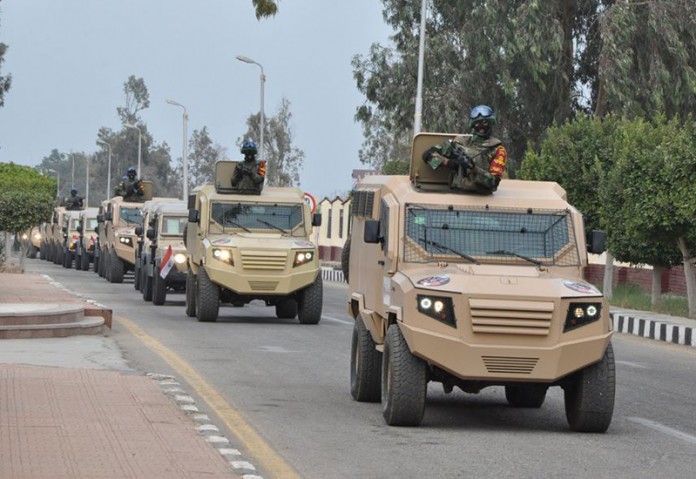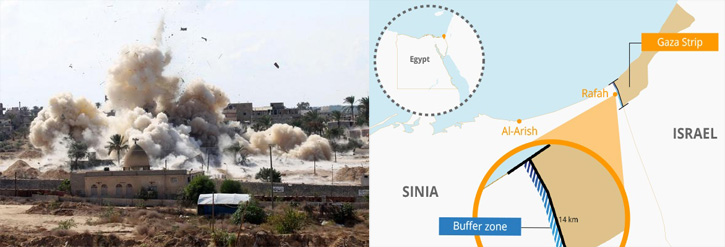

As the war against ISIS rages in Syria and Iraq, Egypt is fighting its own war on terror. On October 24, the Sinai Peninsula witnessed the deadliest attack on Egypt’s military in years. Twenty-eight soldiers were killed and another 30 injured when a car bomb exploded at the Karm al-Qawadis security checkpoint in Sheikh Zuweid in North Sinai.
Hours later, three security personnel were killed when militants opened fire at a checkpoint in nearby El Arish.
Following the attack, Egyptian President Abdul-Fattah el-Sisi declared on State television that “‘foreign hands’ were behind the violence,” and government sources have indicated that violence in Egypt — including Sinai — is linked to the Islamic State of Iraq and Sham (ISIS, also known as Da’ish or ISIL – as it is called by the US).
Intelligence reports have already indicated that Ansar Beit al-Maqdis, an active Islamic salafi group operating against the Egyptian army in Sinai, recently pledged allegiance to ISIS. Intelligence reports indicate that the Islamic State, made up of Iraqis, other Arabs and foreign fighters, has been busy coaching the Sinai-based Ansar militants on how to operate more effectively.

Indeed, Egypt recently had a tumultuous 48 hours: An explosion in a Cairo metro station injured 16 people; terror attacks in Sinai killed five; a bomb exploded at the Egyptian Embassy in Libya’s capital Tripoli; and 13 military servicemen are missing or wounded, following an attack by militants on an Egyptian navy ship off the northern port of Damietta. It was the first time such a naval attack had taken place. Four fishing boats were used in the assault, allegedly carried out by unidentified “terrorists,” four of whom were killed, military sources said. They identified the attackers were smugglers, caught as they entered Egyptian waters. But could it be that the Islamists from Libya were behind this action?
More recently, it was announced that an Egyptian military brigadier-general has been killed, and at least two other soldiers injured in a drive-by shooting in the suburb city of Abu Zaabal in the Qalubiya, north of Cairo. The assassination came after security forces have arrested more than 100 people in advance of planned anti-government demonstrations called by the Egyptian Salafist front for Friday, November 28. Local media reports of multiple bombs have been defused in Fayoum and Alexandria. In Suez, reports indicate gunmen opened fire on the Judges’ Club, while a bomb explosion led to the suspension of the Zagazig-Ismailiya train line.
The rising tension is also part of the preparation for acts of violence that might occur on Friday, as the Egyptian Salafist front is calling for protests on Friday November 28, calling on people to take to the streets.
As it seems, Egypt is already involved in a “full-fledged war” against Islamist groups. President al-Sisi expanded his anti-terrorism campaign to enforce brutal crackdowns on the Muslim Brotherhood opposition. The Egyptian government actually declared the group a terrorist organization earlier this year — but Egypt is still facing an escalation of extremist activity.
The Libyan civil war to the west and the allure of the Islamic State group have fuelled Egypt’s own militant groups and made the country vulnerable to spillover from the region’s other conflicts. A major conflict is evolving in northern Sinai, close to the Hamas-Gaza border and Israel. The lawless mountainous centre of Sinai Peninsula has for years been a hotbed for radical Islamists and a safe-house for a weapons arsenal hidden in the caves.

Located between the Suez Canal and the Arabian Peninsula, the Sinai Peninsula is geographically isolated, but virtually links key states of Egypt, Palestine, Jordan, Israel, and Saudi Arabia. Owing to its geo-political importance, it was a battleground in every war between Egypt and Israel, from 1948 until 1973.
The 1979 peace treaty between Egypt and Israel returned Sinai to Egypt, with a substantially limited Egyptian presence and international military supervision. These have undoubtedly played a significant role in turning this large peninsula into a buffer zone that has helped to prevent large-scale Egyptian-Israeli military confrontations for more than 30 years.
Egyptian officials, including the country’s foreign minister, have acknowledged that coordination exists between Islamic State and other militant groups, including some inside Egypt. The country has faced growingIslamist insurgent activity, since the army toppled President Mohamed Morsi of the Muslim Brotherhood last year. Tempers rise constantly, as the Brotherhood and other Islamic factions issue calls for unrest.
Bagdadi’s “Islamic State” called for some of these attacks, urging Sinai insurgents to press ahead with violence against Egyptian security forces. “Rig the roads with explosives for them. Attack their bases. Raid their homes. Cut off their heads. Do not let them feel secure,” Islamic State spokesman Abu Muhammad al-Adnani said in a statement to Egyptian militants released online. Following suit, the Sinai-based militant group Ansar Beit al-Maqdis has already beheaded seven Egyptians since August.
Sisi, who as army chief led Morsi’s ouster following protests against his rule, has expressed his concerns about militant Islamist activity in Egypt and the Middle East. He has backed Washington’s call for global action to counter the threat from Islamic State. However, Foreign Minister Sameh Shukri has stated that Cairo might not provide direct military assistance to the United States in its battle against the group, saying that the army was fully focused on the home front. The challenge of containing militancy has become more complex since Islamic State militants have expanded their influence by declaring a caliphate in the area, inspiring other militant groups, including some based along Egypt’s border with chaotic Libya, though Egyptian security forces had appeared to be making some progress against Islamist insurgents in Sinai over recent weeks. The Ansar commander said pressure from the army had forced some fighters to flee the area for other places inside Egypt.
This wave of terrorism is not foreign to the Sinai Peninsula, which witnessed massive terrorist attacks in 2004 and 2006. But, currently, the conditions in Sinai have become highly volatile, with attacks and bombings occurring on a regular basis. This calls for determined action by the Egyptian military, requiring Israel’s agreement, to a temporary adjustment of the of the Egyptian military limitations of the 1979 Peace Agreement.
ISIS is also recruiting members in Egypt itself—and rather successfully. In October, an ISIS recruitment cell comprised of eight members was uncovered in the City of Port Said. In an off-the-record conversation with an Egyptian official, a foreign author was informed that no fewer than 5,000 Egyptians, most of whom are radical Salafis, are now fighting in Syria.
Similar to Egyptians fighting with the Mujahideen in Afghanistan and returning to Egypt, the regime could soon face a serious problem with radicalized Egyptians returning from Syria and Iraq with the intention of carrying out domestic terror attacks.
The flow of Egyptian fighters to Syria should come as no surprise. Under the previous regime, President Mohamed Morsi encouraged Egyptians to participate in the jihad in Syria against the Assad regime.
The flow obviously did not stop once Morsi was ousted. Last month, ISIS claimed that a former Egyptian police officer had died in one of its sponsored suicide attacks inside Iraq. This shows that ISIS’s sphere of influence in Egypt has become wider. According to a survey conducted by the Fikra Forum Project of the Washington Institute for Near East Policy, 3% of Egyptians (some 2.5 million) already support ISIS.
Yet, despite its unwillingness to get involved directly in military operations beyond its borders, Egypt can still contribute logistics, intelligence, and ideological support to the anti-ISIS conflict.
Logistically, Egypt can revitalize the military relationship it previously had with the United States by allowing coalition members to use Egyptian air space and by expediting coalition-related traffic through the Suez Canal.
From the intelligence perspective, Egypt has a long history of confronting terrorist organizations, both domestically and abroad. Egypt has been a reliable ally in the American war on global terrorism in terms of intelligence sharing, investigations and interrogations, and tracking suspects; such activities can ultimately aid the coalition considerably.









